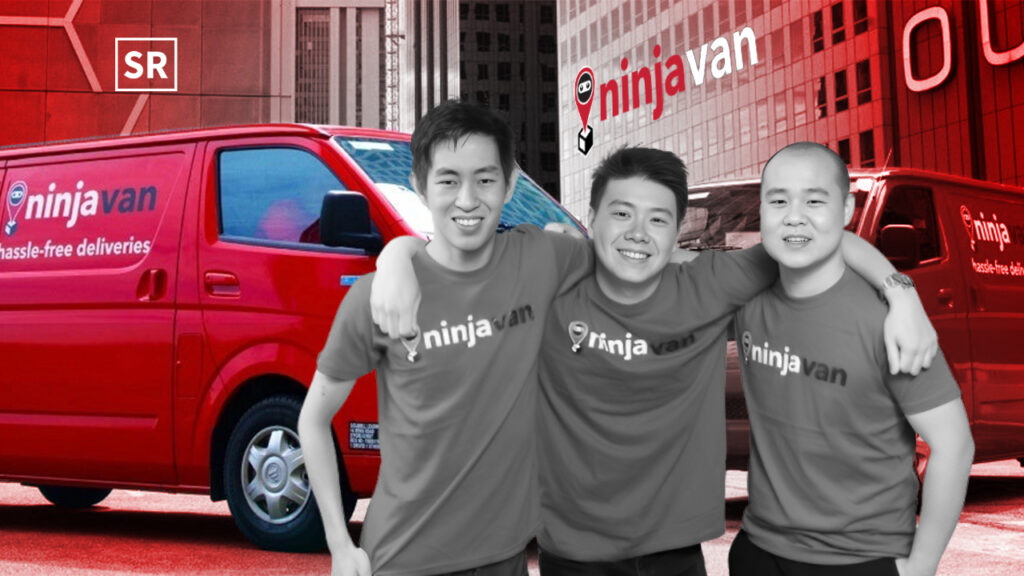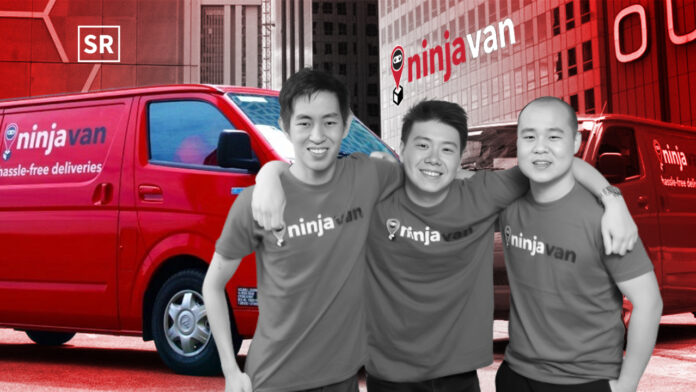
Lai Chang Wen, Shaun Chong, and Boxian Tan shared a common drive to solve real-world problems with technology that led to the creation of Ninja Van, despite having no prior experience in logistics.
During his college days, Lai Chang Wen hustled for pocket money by selling second-hand phones and assembling bicycles from spare parts. His career shifted when he launched a fashion e-commerce brand.
But he constantly ran into one major problem: unreliable deliveries.
That pain point sparked a new path. He teamed up with Shaun Chong, a self-taught coder, and Boxian Tan, a finance and operations professional.
Beginning of a Revolution: Leaving High Paying Jobs
None of the founders came from a logistics background. But they had clarity of purpose and execution speed.
They walked away from high-paying jobs, pooled their savings, and committed to building a logistics company for the new digital economy.
Their technological edge came from thinking about the sector as a technology-enabled service.
Read also – The Story of Stoyana Natseva and Happy Life Academy Transforming Lives
From One Van to Logistics Empire
Ninja Van started with a single van and a small warehouse in Singapore. Lai handled the first deliveries himself, Shaun built the tracking system and Boxian took charge of merchant relations.
Every parcel delivered was a learning experience, and every late package was a chance to optimize. The team hustled day and night, building trust with small businesses across the city.
Creating a New Logistics Blueprint from the Ground Up
From the very beginning, everything was done with limited resources and a hands-on approach. Couriers were hired face-to-face, and hubs were set up manually. Every system was built from scratch and constantly improved, while the software evolved alongside the growing delivery network.
Rather than mimic global players, the founders built tools tailored to Southeast Asia’s hyperlocal delivery challenges. They proved logistics could be rebuilt from the ground up with code, determination, and customer empathy.
Read also- Beewise: Saving Bees with AI, Robots, and a Mission to Protect the Planet
Breaking Through with Big Clients and Bigger Volumes
The company’s big break came when major e-commerce players like Lazada and Shopee adopted Ninja Van as a preferred delivery partner. Daily parcel volumes surged.
More merchants came on board. Operational scale became a necessity rather than an ambition.
Expansion across the region followed quickly, and Ninja Van became synonymous with dependable e-commerce fulfillment in one of the world’s fastest-growing markets.
Scaling Southeast Asia’s Logistics Operating System
Ninja Van expanded across Singapore, Malaysia, Indonesia, Thailand, Vietnam, and the Philippines. With every new market, its systems are adapted to local nuances—regulatory, geographic, and cultural.
Over two million merchants now rely on Ninja Van’s platform.
The company employs over 100,000 delivery personnel and powers end-to-end logistics across borders, cities, and remote villages.
Its technology stack supports sorting, routing, returns, inventory visibility, and last-mile optimization, forming an intelligent logistics backbone for the region.
From Startup Hustle to over $1 Billion Valuation
Global investors saw the potential early. Ninja Van raised over $1 billion in funding from names like Geopost, B Capital, and Monk’s Hill Ventures.
Its valuation crossed the billion-dollar mark, and with strong fundamentals in place, the company continues to move steadily toward an IPO. Ninja Van now stands as one of Southeast Asia’s most important enablers of commerce.
A Leadership Culture Grounded in Execution
The founding team remains deeply involved in operations. They visit warehouses, meet frontline teams, and continuously refine processes.
Their leadership style is grounded in simplicity, ownership, and trust in teams. Culture is shaped by a willingness to do the work and a belief in building for scale, not just speed.
How Ninja Van Became the Backbone of E-Commerce in Southeast Asia
At Ninja Van, execution speaks louder than hype. The team built quietly behind the scenes through unwavering consistency, trusted relationships, and tangible results.
Each product shipped, each delivery made, and each merchant supported is connected to a larger mission of digitizing and democratizing logistics in the region.
Introduction to AI-driven route planning
Ninja Van is now investing in AI-driven route planning, warehouse robotics, cold-chain capabilities, and cross-border e-commerce integrations.
The roadmap includes expansion into new sectors like healthcare logistics, predictive analytics for supply chains, and smarter tools for small merchants.
IPO preparation is underway, and the company is positioned to become Southeast Asia’s most advanced logistics tech platform.
Together, Lai Chang Wen, Shaun Chong, and Boxian Tan have built a company that is a technology-led infrastructure powering e-commerce across Southeast Asia.
What does Ninja Van do?
Ninja Van is a tech-enabled logistics company that provides fast, reliable, and fully integrated last-mile delivery solutions across Southeast Asia, serving millions of e-commerce businesses and customers.
Who are the founders of Ninja Van?
Ninja Van was founded by Lai Chang Wen, Shaun Chong, and Boxian Tan.
Where is the headquarter of Ninja Van?
Ninja Van is headquartered in Queenstown, Singapore.
When was Ninja Van founded?
Ninja Van was founded in 2014.





